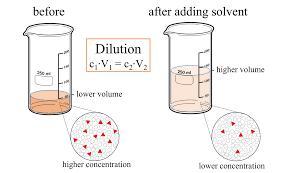Which of the following solutions will have the highest concentration of chloride ions? Which of the following solutions will have the highest concentration of chloride ions? 0.10 M MgCl2 0.10 M AlCl3 0.05 M CaCl2 0.10 M LiCl All of these solutions have the same concentration of chloride ions.
Answers 3
Answer:
0.10 M AlCl₃.
Explanation:
We can calculate the concentration of chloride ion [Cl⁻] in each salt:
- 0.10 M MgCl₂:
MgCl₂ is dissociated according to the reaction:
MgCl₂ → Mg²⁺ + 2Cl⁻,
Every 1 mol of MgCl₂ produces 2 mol of Cl⁻.
So, [Cl⁻] = (2)*(0.1 M) = 0.2 M.
- 0.10 M AlCl₃:
AlCl₃ is dissociated according to the reaction:
AlCl₃ → Al³⁺ + 3Cl⁻,
Every 1 mol of AlCl₃ produces 3 mol of Cl⁻.
So, [Cl⁻] = (3)*(0.1 M) = 0.3 M.
- 0.05 M CaCl₂:
CaCl₂ is dissociated according to the reaction:
CaCl₂ → Ca²⁺ + 2Cl⁻,
Every 1 mol of CaCl₂ produces 2 mol of Cl⁻.
So, [Cl⁻] = (2)*(0.05 M) = 0.1 M.
- 0.10 M LiCl:
LiCl is dissociated according to the reaction:
LiCl → Li⁺ + Cl⁻,
Every 1 mol of LiCl produces 1 mol of Cl⁻.
So, [Cl⁻] = (1)*(0.1 M) = 0.1 M.
So, the solution will have the highest concentration of chloride ions is AlCl₃.
-
Author:
spud0bos
-
Rate an answer:
2
From the given options, the solution of 0.10M AlCl₃ is the one that has the highest concentration of chloride ions.
To know which of the given solutions has the highest concentration of chloride ions, we must evaluate each of them.
1) 0.10 M MgCl₂
We can see that in 1 mol of MgCl₂, we have 1 mol of Mg²⁺ and 2 moles of Cl⁻ ions, so if the initial concentration of MgCl₂ is 0.10 M we have:
[Cl^{-}] = \frac{2\: moles\: Cl^{-}}{1 \: mol\: MgCl_{2}}*\frac{0.10 \:mol\: MgCl_{2}}{1 L} = 0.20 M
Hence, in this solution we have 0.20 M of chloride ions.
2) 0.10 M AlCl₃
In 1 mol of AlCl₃, we have 1 mol of Al³⁺ and 3 moles of Cl⁻, so the concentration of Cl⁻ is:
[Cl^{-}] = \frac{3\: moles\: Cl^{-}}{1 \: mol\: AlCl_{3}}*\frac{0.10 \:mol\: AlCl_{3}}{1 L} = 0.30 M
Then, the concentration of chloride ions in this solution is 0.30 M.
3) 0.05 M CaCl₂
We can notice that in 1 mol of CaCl₂ we have 1 mol of Ca²⁺ and 2 moles of Cl⁻. The concentration of Cl⁻ is:
[Cl^{-}] = \frac{2\: moles\: Cl^{-}}{1 \: mol\: CaCl_{2}}*\frac{0.05 \:mol\: CaCl_{2}}{1 L} = 0.10M
So, the concentration of the Cl⁻ ions is 0.10 M.
4) 0.10 M LiCl
In this case, in 1 mol of LiCl we have 1 mol of Li⁺ and 1 mol of Cl⁻, so the concentration of the chloride ions is:
[Cl^{-}] = \frac{1\: moles\: Cl^{-}}{1 \: mol\: LiCl}*\frac{0.10 \:mol\: LiCl}{1 L} = 0.10 M
Hence, in this solution the concentration of the Cl⁻ ions is 0.10 M.
Therefore, the solution 0.10M AlCl₃ has the highest concentration of chloride ions.

-
Author:
hardy4c0o
-
Rate an answer:
5
AI generated Answer
-
Rate an answer:
0
Do you know an answer? Add it here!
Unable to find an answer to your question?
Don't worry! There are several alternative approaches you can try to resolve your query. Here are some tips to help you find answers in different ways:
- Reframe your question: Sometimes, the way you phrase your question can limit your search results. Try rephrasing it using different keywords or providing more context to get better results.
- Utilize social media: Post your question on social media platforms, particularly those focused on professional or specialized topics. Twitter, LinkedIn, and Facebook groups can connect you with individuals who may have relevant expertise or experiences to share.
- Consult subject matter experts: Reach out to experts in the field related to your question. Many professionals are willing to help and share their knowledge. You can connect with them through email, LinkedIn messages, or by attending relevant conferences or events.
- Use our website to find your question through the search box above, or you can sign up to ask your question for our big educational community. Our experts will review your question, and you will get a quick and quality answer.
- Collaborate with others: If your question is related to a specific project or problem, consider collaborating with others who might have complementary skills or knowledge. Teamwork can lead to innovative solutions and shared insights.
Remember, the process of finding answers often involves persistence, creativity, and an open mind. By exploring various resources, reaching out to others, and being proactive in your search, you increase your chances of finding the information you need. Happy quest for knowledge!
